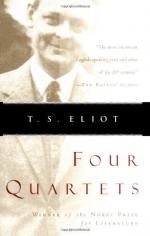
|
| Name: _________________________ | Period: ___________________ |
This test consists of 5 short answer questions, 10 short essay questions, and 1 (of 3) essay topics.
Short Answer Questions
1. What does the speaker say "Crack and sometimes break, under the burden," in Part V of "Burnt Norton"?
2. By what is the "sultry light" absorbed in Part I of "East Coker"?
3. What is desiccated when the speaker descends into a different world in the latter lines of "Burnt Norton," Part III?
4. What adjective is applied to "Friday" in the final line of Part IV of "East Coker"?
5. How many years "largely wasted, the years of l'entre deux guerres," does the speaker mention having passed in Part V of "East Coker"?
Short Essay Questions
1. Who is the "wounded surgeon" of Part IV of "East Coker," and what indicates this within the stanza?
2. What is meant by the "intolerable wrestled / With words and meanings" in the second part of "East Coker"?
3. What does the speaker mean when he states in Part V of "East Coker" that "there is no competition - / There is only the fight to recover what has been lost And found and lost again and again"?
4. What are the other echoes which inhabit the rose-garden in Part I of "Burnt Norton"?
5. What does it mean to say, as the speaker does in the final line of Part II of "Burnt Norton," that "Only through time time is conquered"?
6. What does the speaker mean by saying in Part V of "Burnt Norton" that love is caught "in the form of limitation"?
7. What is the significance of the first 13 lines of "East Coker"?
8. What does the speaker mean in the latter lines of Part III of "Burnt Norton" when he states that "This is the one way, and the other / Is the same"?
9. What does the speaker mean by commanding, in Part III of "East Coker," that one wait without hoping or loving, and that "the faith and the love and the hope are all in the waiting"?
10. What is the purpose of the line, repeated and modified throughout the first part of "East Coker," "In my beginning is my end"?
Essay Topics
Write an essay for ONE of the following topics:
Essay Topic 1
In Part II of "East Coker," the speaker disdains the conventional wisdom of old men, and instead prefers to hear of their follies, stating that humility is the only true wisdom. Examine this sequence of statements as it is presented in the poem in a thoughtful essay. What is wisdom? What is humility? In what way are they related as concepts? In what way are they related in reality? How is this shown by the speaker in "East Coker"? How is this dependent upon the speaker's beliefs? How is this related to the larger concepts within The Four Quartets? How does this rejection of conventional wisdom cohere with the rest of the poem?
Essay Topic 2
Pat III of "East Coker" is eminently concerned with man's feelings of anxiety in the modern world, particularly as he is left with a sense of being conscious of nothing, or the content of the things of which he is conscious being essentially nothing. Examine this prevalence of anxiety as it is presented in the poem. What is anxiety? What does anxiety do to a person? In the face of what is man made anxious? Why does he have these feelings of anxiety? What does this indicate about the nature of the human person? What does this indicate about the nature of the things with which man regularly occupies himself in the world? How is this significant to the meaning of the poem as a whole? How is it significant to the whole of The Four Quartets?
Essay Topic 3
Throughout all four of the poems in The Four Quartets, circularity and wholeness are brought to light and the object of hints and vague statements. In the final part of "Little Gidding," they are summed up and the poems are brought into a sort of unity. Discuss the manner in which they are unified and how they are all interrelated, as demonstrated in this final part. In what way is the final part of the work a conclusion of the whole? How does it relate to each of the four poems? How does it contain them all? How is the beginning shown to be in the end? How is the end found in the beginning? What does this indicate about human nature? What does this indicate about the world and about time? How does it relate to the prevalent concern with the universal and infinite that pervades the poetry?
|
This section contains 1,300 words (approx. 5 pages at 300 words per page) |

|




